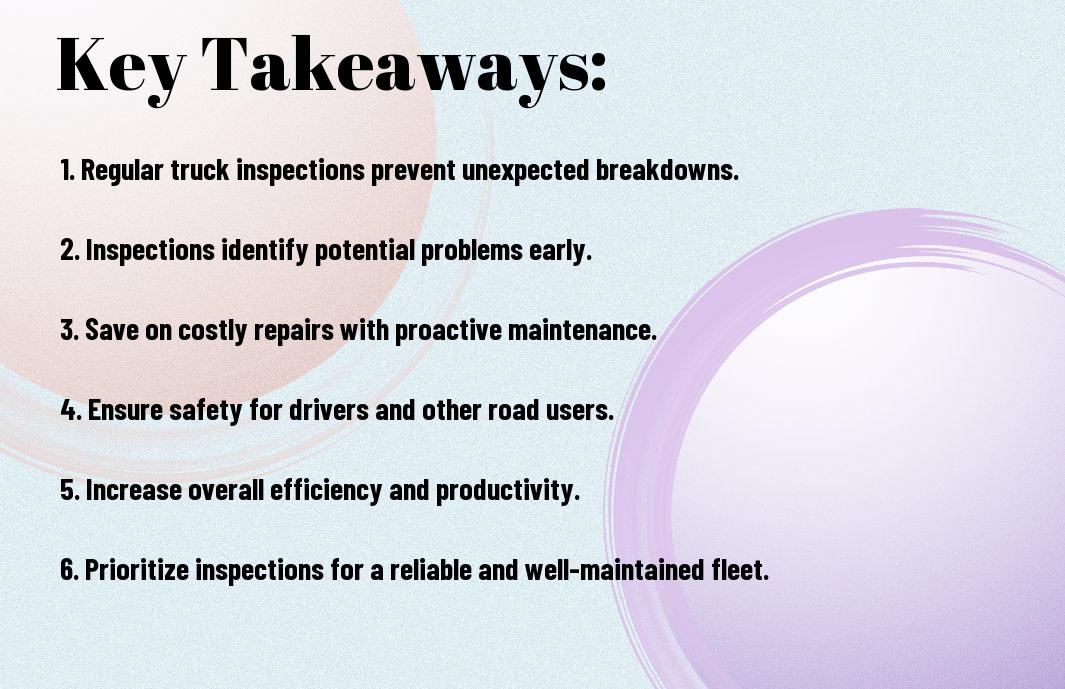Are You Prioritising Regular Truck Inspections To Prevent Unexpected Breakdowns?
It’s crucial for all truck owners to prioritise regular truck inspections in order to prevent unexpected breakdowns. Neglecting these routine check-ups can lead to costly repairs, safety hazards, and downtime that can disrupt your business operations. By staying vigilant with inspections, you can identify potential issues early and address them before they escalate into major problems. Don’t overlook the importance of maintenance to keep your trucks running smoothly and efficiently.
Key Factors To Keep In Mind:
- Regular truck inspections are crucial: Inspecting your truck on a regular basis can help identify potential issues early on and prevent unexpected breakdowns on the road.
- Preventive maintenance saves time and money: By prioritising regular inspections, you can address minor issues before they escalate into costly repairs, saving you both time and money in the long run.
- Ensure safety and reliability: Regular truck inspections ensure that your vehicle is safe to operate and reliable, providing peace of mind for both drivers and fleet managers.

Understanding Truck Inspection Schedules
Preventative Maintenance Timelines
Any effective preventive maintenance program includes regular 12 week truck inspections to ensure the vehicle’s safety and performance on the road. These inspections are crucial in identifying potential issues before they escalate into costly breakdowns. By adhering to a strict inspection schedule, you can minimize unexpected downtime and keep your trucks running smoothly.
Critical Inspection Points
One of the most critical aspects of a truck inspection is checking key components that are prone to wear and tear. Regularly inspecting brakes, tyres, lights, steering, and suspension systems can help detect any problems early on, preventing accidents and breakdowns on the road. Ignoring these critical inspection points can put your drivers and other road users at risk.
When considering truck maintenance, prevention is always better than cure. By implementing a thorough 12 week inspection schedule and focusing on critical inspection points, you can ensure the safety of your drivers and the reliability of your vehicles on the road. Stay proactive and prioritize regular truck inspections to avoid unexpected breakdowns and costly repairs.
Common Issues Uncovered in Truck Inspections
Wear and Tear Components
All trucks are subject to wear and tear as they rack up miles on the road. During regular truck inspections, key components such as tyres, brakes, suspension systems, and engine belts are thoroughly checked for signs of wear and tear. Failure to address worn-out components can lead to unexpected breakdowns and potentially hazardous situations on the road.
Potential Safety Hazards
On top of wear and tear components, truck inspections also focus on identifying potential safety hazards that could compromise the driver, cargo, and other road users. Issues such as malfunctioning brakes, faulty lights, and worn-out tyres are among the top safety hazards that need to be promptly addressed to prevent accidents.
Regular inspections play a crucial role in ensuring the overall safety and reliability of trucks on the road. By proactively identifying and addressing wear and tear components and potential safety hazards, fleet managers can prevent unexpected breakdowns and prioritize the safety of drivers, vehicles and cargo.
Benefits of Prioritising Truck Inspections
Cost Savings from Avoiding Breakdowns
Not conducting regular truck inspections can lead to unexpected breakdowns, resulting in costly repairs and downtime. By prioritising inspections, companies can identify potential issues early on and address them proactively, saving significant costs in the long run.
Enhanced Fleet Reliability and Longevity
Avoiding breakdowns through regular inspections not only saves money but also enhances fleet reliability and longevity. Regular maintenance ensures that trucks are in optimal condition, reducing the risk of unexpected failures and extending the lifespan of the vehicles.
Implementing Effective Inspection Strategies
Training for Drivers and Maintenance Crew
Effective training for drivers and maintenance crew is crucial for ensuring proper truck inspections. Educating them on the importance of regular 12 week inspections, teaching them how to conduct thorough checks, and empowering them to identify potential issues can significantly reduce the risk of unexpected breakdowns. This training can help instill a culture of proactive maintenance, leading to improved safety and operational efficiency.
Leveraging Technology for Inspection Management
Leveraging advanced technology for inspection management can streamline the process and enhance the accuracy of inspections. Implementing digital inspection checklists and maintenance tracking systems can provide real-time insights into the condition of your fleet. By using software solutions and telematics, you can automate reminders for scheduled inspections, monitor trends in maintenance needs, and identify patterns that may require attention. This proactive approach can help you address issues before they escalate, ultimately improving the reliability of your trucks.
When Leveraging Technology for Inspection Management, consider investing in tools such as fleet management software, electronic logging devices (ELDs), and mobile apps designed for maintenance tracking. By centralizing inspection data and integrating it with your overall fleet management system, you can easily access comprehensive reports and analysis to make informed decisions about maintenance priorities and preventive measures.
Summing up
Following this comprehensive discussion, it is clear that prioritizing regular truck inspections is crucial in preventing unexpected breakdowns. By proactively identifying and addressing potential issues, businesses can minimize costly repairs, delays in delivery schedules, and ensure the safety of drivers and other road users. Implementing a robust inspection routine that covers all critical components of the vehicle will help companies maintain the reliability and efficiency of their fleet. Neglecting these inspections can lead to unforeseen mechanical failures, decreased productivity, and ultimately, unfavourable financial impacts. Therefore, investing time and resources in regular truck inspections is a proactive measure that should not be overlooked.
Frequent Questions Answered!
Q: Why is prioritising regular truck inspections important?
A: Regular truck inspections are important because they help prevent unexpected breakdowns by identifying potential issues early on. This proactive approach can save time and money by addressing problems before they escalate into more serious and costly repairs. Are You Prioritising Regular Truck Inspections?
Q: How often should truck inspections be conducted?
A: Truck inspections should be conducted on a regular basis, depending on the type of vehicle and its usage. It is recommended to have inspections performed at least every 12 weeks or every 12,000 miles to ensure that all components are in good working condition. Are You Prioritising Regular Truck Inspections?
Q: What are some common areas to focus on during truck inspections?
A: During truck inspections, it is important to focus on critical components such as brakes, tyres, lights, fluid levels, and overall vehicle condition. Paying attention to these key areas can help prevent unexpected breakdowns and ensure the safety and reliability of the truck on the road.
O’Donnell Commercials Truck and Trailer Parts, Donegal, Ireland.
- Delivering throughout Ireland and to the UK daily
- Phone: 074 93 90122
- sales@odonnellcommercials.ie
- Taking bookings for 12 Week Inspections


